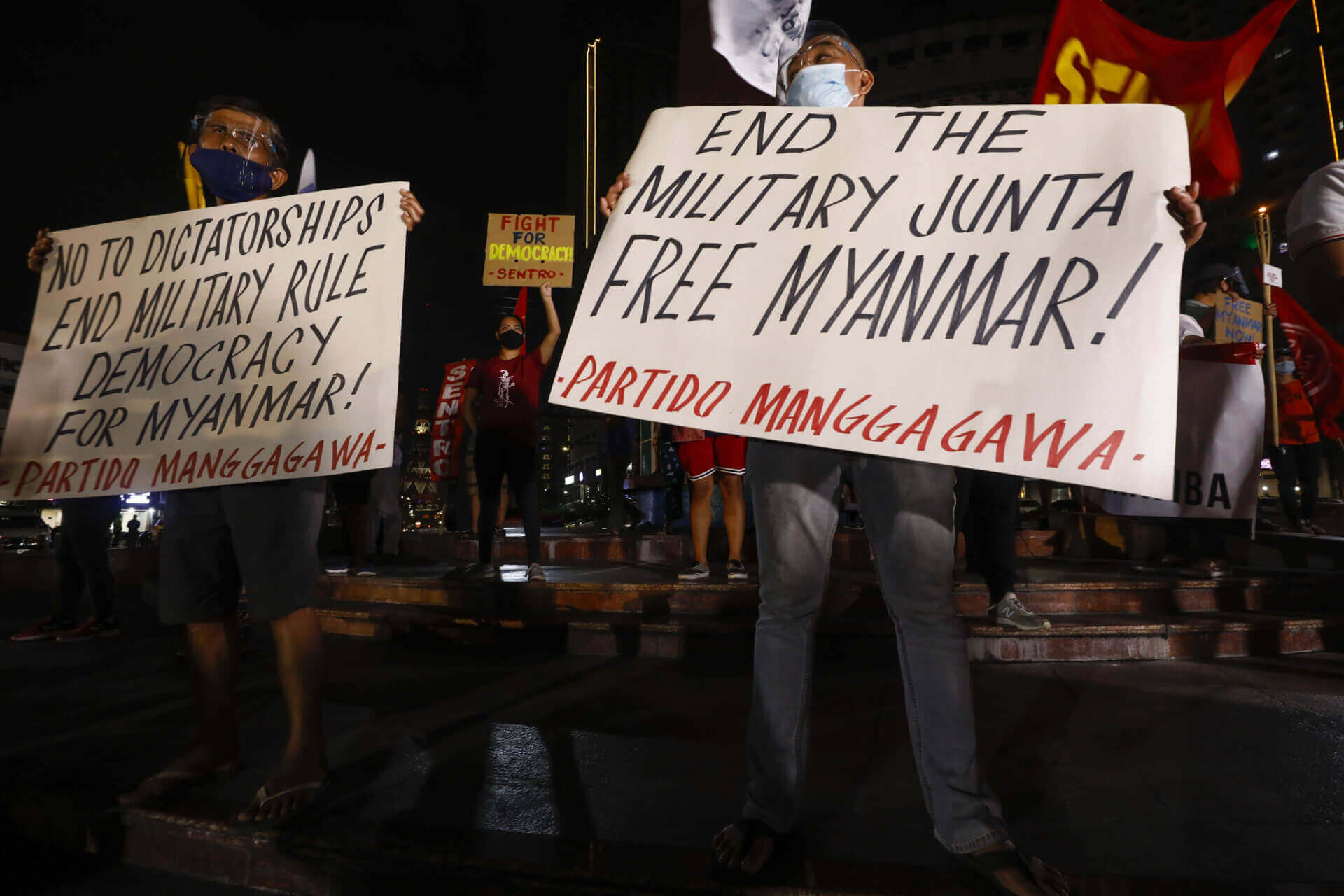The United States (US) and the European Union (EU) on Tuesday imposed a fresh round of sanctions against high-ranking military officials in Myanmar as well as entities and individuals involved in financing and providing arms to the military.
The US Department of the Treasury’s Office of Foreign Assets Control (OFAC) noted in a press release that its decision was “taken in conjunction” with the EU to mark the second anniversary of Myanmar’s last general election, on 8 November 2020, the results of which were “brutally overturned by a military coup” on 1 February last year.
OFAC sanctioned one individual and one entity that aid the junta in purchasing weapons. The individual in question, Kyaw Min Oo, is a Burmese businessman with close ties to the military.
At its Summit later this week, @ASEAN faces difficult choices in deciding its own next steps to address the military takeover in Myanmar more effectively. The EU will continue to offer its support as ASEAN scales up its efforts to promote a resolution of the crisis 2/2
— Josep Borrell Fontelles (@JosepBorrellF) November 8, 2022
“Since before the February 2021 coup, Kyaw Min Oo has facilitated arms deals and weapons purchases on behalf of Burma’s military, while also acting as the middleman to arrange visits to Burma by high-ranking foreign military officers,” the release said.
The Treasury also accused his company, Sky Aviator Company Limited, of facilitating “upgrades and maintenance” for military aircraft.
“Kyaw Min Oo profits from the violence and suffering the military has inflicted on the people of Burma since the military coup,” remarked Under Secretary of the Treasury for Terrorism and Financial Intelligence Brian E. Nelson.
We welcome @eu_eeas designations related to Burma, in concert with our own sanctions today. We are sending a clear signal that we are in lockstep with partners and allies to promote justice and accountability for the Burma military regime’s atrocities. https://t.co/5dyj4ADkuE
— Secretary Antony Blinken (@SecBlinken) November 8, 2022
He added that the move reaffirmed the US’ “commitment to continue increasing pressure on the regime and its supporters until they change course and allow for a return to democracy.”
The department accused the Asian nation’s military regime of oppressing and denying “the will of the people to chart an inclusive, democratic future for their country.” It also clarified that the US’ sanctions did not target the country’s common people, but rather “those who profit from the oppressive actions of the regime by operating in the defence sectors of Burma’s economy and by enabling Burma’s military connections to foreign militaries.”
The sanctions freeze Kyaw and his company’s properties and interests within the US and also prohibit US citizens and entities from “making of any contribution or provision of funds, goods, or services” that “benefit” him.
The EU 🇪🇺 adopts new sanctions against those military in 🇲🇲 #Myanmar responsible for the contuining rise of violence against its own people. New listing includes 19 new persons and one entity 👇 https://t.co/ban9y81yAH
— Igor Driesmans (@EUAmbASEAN) November 8, 2022
Commenting on the sanctions, US Secretary of State Antony Blinken said on Tuesday that the move was part of the US’ efforts to take “additional actions against those who enable the regime’s violence, particularly its repeated air assaults and killing of civilians.” He made reference to the regime’s “lethal air strikes against the political opposition and the broader civilian population” since it took power.
He also made note of aerial bombings in the Kachin state on 23 October that killed around 100 people, describing them as the “deadliest bombings since the coup,”
He also accused Kyaw of facilitating foreign military officers’ visits to the country, the import of arms and other military equipment, as well as of providing assault helicopter upgrades.
According to Amnesty International, which documented 16 air attacks between March 2021 and August 2022, the military has used cluster munitions, which are banned internationally, in at least two attacks.
Two public buildings (a church and a primary school) and a house were destroyed in an air strike carried out by the military junta today in Lu Thaw Township, Mutraw District #Myanmar. It is necessary to impose a global arms embargo and sanctions on aviation fuel. #AirStrike pic.twitter.com/nRqB793HHI
— Nay Phone Latt (@bloggernpl) November 9, 2022
Meanwhile, the European Council said in its press release announcing a fight round of sanctions on the Myanmar junta that it is deeply concerned by the “continuing escalation of violence and grave human rights violations following the military takeover two years ago.”
The bloc said its new sanctions target 19 individuals and one entity, including the Minister of Investment and Foreign Economic Relations Kan Zaw, Supreme Court Chief Justice Htun Htun Oo, high-ranking members military, members of the Union Election Commission, and business representatives of private companies with close ties to the Tatmadaw.
Last month, the European Parliament called for additional sanctions against those responsible for human rights violations in #Myanmar 🇲🇲
— Marianne Vind (@MarianneVind) November 9, 2022
I am very happy to see the 5th sanction package adopted! 🇪🇺In absence of any improvement in Myanmar, the EU must take action!#ASEAN https://t.co/veZ5pbjDb5
The EU has thus far sanctioned 84 individuals and 11 entities. Like the US, the 27-nation bloc’s sanctions subject sanctioned individuals to asset freezes and travel bans, which prevent them from entering or transiting through EU territory. In addition, EU citizens and entities are prohibited from sending funds to them.
According to the Thailand-based human rights group Assistance Association for Political Prisoners, more than 2,400 people have been killed and some 16,110 have been arrested since the coup.

